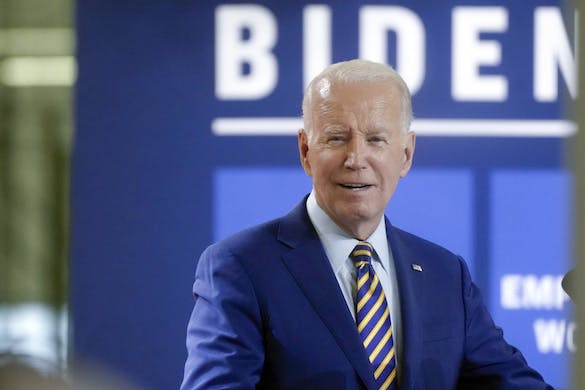Could a Pending Supreme Court Case Upend President Biden’s Billionaire Tax on Assets?
The newly unveiled budget, which includes taxing unrealized asset gains, could face scrutiny as the Supreme Court considers a separate case that argues the Sixteenth Amendment prevents taxing unrealized income.

As President Biden unveiled a $7.3 trillion budget on Monday, his promise to “make the wealthy pay their fair share,” partially through a new asset tax on unrealized capital gains, raises constitutional questions that may unfold in a separate case that is pending before the Supreme Court.
Mr. Biden’s budget proposal includes familiar rhetoric from the Democratic party about revamping taxes to “make wealthy tax cheats pay the taxes they owe” and includes a slew of proposals to increase taxes on large corporations and the wealthy while eliminating tax subsidies for real estate, oil and gas, and cryptocurrency transactions.
A notable part of the budget is Mr. Biden’s reintroduced billionaire minimum income tax proposal. It would require eligible wealthy taxpayers — those whose net worth is over $100 million — to pay a 25 percent minimum tax which also includes taxing their unrealized asset gains.
When an asset increases in value but isn’t sold, tax code doesn’t typically consider that added value as taxable income, the Institute on Taxation and Economic Policy notes, allowing asset owners to defer paying taxes on the “unrealized capital gains” until selling them.
“Billionaires make their money in ways that are often taxed at lower rates than ordinary wage income, or sometimes not taxed at all, thanks to giant loopholes and tax preferences that disproportionately benefit the wealthiest taxpayers,” Mr. Biden said in a statement, adding that the tax would address the “glaring inequity” between average Americans and the rich.
Yet, a pending Supreme Court case raises questions about the constitutionality of such wealth taxes. The high court heard arguments in December for Moore v. United States, which has the potential to preemptively ban wealth taxes in America, as the Sun has reported.
The case centers around a Washington state couple, Charles and Kathleen Moore, who argue that because they have not sold, or received earnings from, their investment in an Indian company, taxes on it are unconstitutional. The couple argues that the Sixteenth Amendment and subsequent court precedent have determined that income requires realization of earnings.
The brief before the Supreme Court notes that the importance of the Sixteenth Amendment question “cannot be overstated.”
“This case presents a fundamental constitutional question concerning Congress’s core power of taxation,” the filing reads. “That question is not only politically important, but practically important, as American families and businesses plan their financial futures.”
As noted in the Sun’s reporting, the outcome of the case could have “drastic effects” and reduce government revenue by billions of dollars.
The Sun’s editorial page has observed that the Constitution is “a bulwark against a wealth tax,” and warned, “once enacted, what would stop a wealth tax from eventually coming after middle-class taxpayers?”
The reaction to Mr. Biden’s budget has been mixed, with some such as Senator Warren taking to X on Monday to praise raising taxes on the wealthy.
“President Biden said it best: No billionaire in our country should pay a lower tax rate than a teacher, a sanitation worker, or a nurse,” she wrote, adding that Democrats are fighting to “right this wrong.”
Yet the budget proposal is already facing blowback from House Republicans, as leaders said in a scathing statement that Mr. Biden was prioritizing spending trillions on “his left-wing agenda” rather than addressing “crushing inflation and mounting national debt.”
“The price tag of President Biden’s proposed budget is yet another glaring reminder of this Administration’s insatiable appetite for reckless spending and the Democrats’ disregard for fiscal responsibility,” the statement noted. “Biden’s budget doesn’t just miss the mark — it is a roadmap to accelerate America’s decline.”
After previewing themes from his budget in his State of the Union speech last week, Mr. Biden faced criticism for complicating the tax code further and discouraging investment and saving in America.
“Rather than aiming for a simpler tax code that broadly encourages investment, saving, and work in the United States, the president has promised higher taxes that would decrease economic output and incomes, reduce U.S. competitiveness, and further complicate the tax code,” the Tax Foundation noted.

